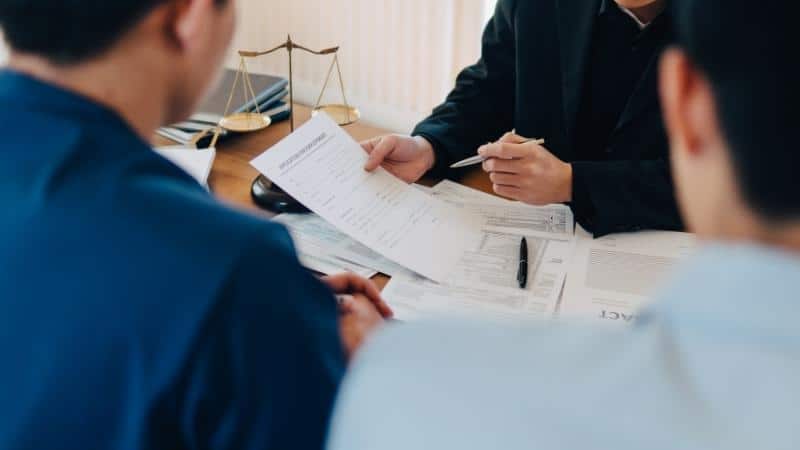If you have just found yourself in need of legal assistance for a legal matter and this is your first time, you probably have a lot of concerns and worries about how the lawyer relationship works. “How often would lawyers call their clients?” is a question frequently heard from clients.
The answers to these questions consider a variety of factors and vary from one lawyer to another; nevertheless, providing some basic details about the lawyer relationship in a number of alternative sorts of cases may well be useful if you’re concerned about the interaction between you and your lawyer, as well as how frequently lawyers update their clients in overall.
Communication is an important component of the client-lawyer relationship, and it is essential if you want to get the most money for your claim. Communication is so crucial that it is listed as one of the first points in the American Bar Association’s Model Rules of Professional Conduct.
Rule 1.4 of the American Bar Association’s Model Rules of Professional Conduct sets up exactly how a lawyer must stay in touch with a client, with precise expectations regarding what constitutes fair contact. Though words like “prompt” and “reasonable” appear in the language, they might well have distinct meanings for the client and the lawyer. In light of this, these are amongst the most important reasons your lawyer might not be contacting you as often as he or she should be.
There are lawyers and a number of support workers in conventional legal practice. Paralegals, secretaries, and/or assistants might make up the support personnel. Since you should always speak to your lawyer initially and keep in touch with him or her as needed, it is normal to contact a paralegal, assistant, secretary for routine affairs.
You might not even notice from your lawyer straightforwardly because it is often simpler and more convenient to interact with one of the support personnel when you have queries or have to convey messages. Your lawyer might well invest a substantial amount of time in trial and/or in the consultation process, so you might not perceive them immediately. Naturally, your lawyer will be informed of all conversations you have with the support staff and will contact you personally if necessary.
The regularity with which you hear from your lawyer will indeed be determined in large part by the sort of legal problem you are dealing with. A personal injury matter, for instance, will normally necessitate a great lot of contact in the initial days and weeks of the case before going inactive while you pursue prescribed therapy. Your lawyer will start negotiating a settlement after you have attained “full medical recovery,” which means you will probably not get any better from that moment on. Then you’ll be able to communicate with your lawyer afterward.
A civil case arising from a contract breach, for instance, can take quite a long time to settle. Months might pass without anything major occurring that warrants communications from your lawyer in this scenario. This isn’t to say the lawyer isn’t working diligently; it just means there isn’t anything to talk about right now. If you are a suspect in a criminal proceeding, on the other hand, you might have more frequent contact with your lawyer as evidence comes to light and a solution to the particular instance is worked out or court preparations have started.
The standard line is that as a client, you have always had the right to require to be kept informed of any major changes in your issue and to maintain a constant line of communication with your lawyer. If you have any concerns about lawyer-client communications or the lawyer-client relationship overall, call a local criminal defense firm for a free consultation.

When your lawyer is irresponsive of updating your case to you
Take into account that you aren’t your lawyer’s single most important client. it is possible that something has started coming up in another case that takes priority, or that s/he is on the court. Something had also arisen in the lawyer’s private affairs.
If your lawyer isn’t phoning you as frequently as you’d like, it is likely that your matter has come to a halt. There is nothing more they can get at this time. They could be awaiting a response from the other lawyer or insurance provider, or they could be awaiting the documentation required to move forward with your claim. Some lawyers are simply overworked. They might well be unaware of your dissatisfaction. Begin by stating unequivocally that you are not receiving the solutions you require and that you do not believe they make more time for you.
Don’t express your anger or point fingers; simply tell the facts. In the same chat, inform them that you will need them to make more time for you (and respond swiftly!) or you’ll have to find a new lawyer. If it is simpler for you, this can be done through the mail. Not every lawyer manages his or her time effectively. At both small and large law firms, clients can simply get pushed behind when lawyers have several cases on the go.
When it comes to case administration, large personal injury law companies with hundreds of lawyers and perhaps numerous cases on the go generally use an automated assembly approach. Your personal injury case might be a piece of equipment on their assembly line. Your issue may be farmed off to other paralegals or lawyers at some time.
While reading reviews of major legal firms, accusations of communication problems are all too typical. “At initially, they were responsive,” prior clients might comment, “but then I went 6 months without receiving any updates from my lawyer.” The possibility of your case being pushed to the wayside isn’t limited to large law companies; it can also happen at smaller law firms. Smaller law firms may lack the funds to appropriately manage all of their pending cases, leading to poor communications.
If you’ve called, left texts, and sent emails to your lawyer but still haven’t gotten a reply, the correct course of action is to transfer a registered letter to his or her office beginning to question the lack of communication and notifying them that you’re eager to find a new lawyer if the scenario doesn’t change. Verified mail is a USPS system that provides the sender with a mailing confirmation and also digital verification that the email was delivered. It is widely used by law firms as confirmation of receipt of a parcel, documents, or articles, and your lawyer will realize that they will never claim that they did not receive your message.
Your lawyer will most likely respond by becoming more open or by stating that you are eligible to pursue new counsel at this time. If you and your lawyer decide to pursue your claim together, you must establish some basic effective communication standards to avoid future problems. If you can’t come to an agreement, pay any pending dues, collect your files, and hire a lawyer ready to deal with you.

What should I do if my lawyer is not updating my case properly?
Clients should urge that their lawyers fulfill their ethical duties to keep them informed about their cases’ development. A lawyer’s responsibility to keep clients informed is described by ethical guidelines as having two main parts: informing the respondent of case advancements (such as a prosecutor’s decision to offer a plea deal or identifying an effective defense testimony) and responding relatively quickly to a plaintiff’s request for clarification.
Lawyers, not clients, are responsible for keeping clients updated. However, on the assumption that if a lawyer makes a mistake, the client is typically the one who pays, defendants might take the following actions to ensure good communication with their lawyers in order to get regular updates:
- Address the issue as soon as possible. Establish a clear knowledge of cases updates ahead of time. If a lawyer’s standard practice is to notify clients only when anything significant happens, the client should be informed of this from the commencement of the relationship. If a client requests (and is willing to pay for) frequent updates regardless of whether or not changes have occurred, that can also be specified in advance—even in a formal retainer contract.
- Don’t be unreasonable. When a client calls his or her lawyer for updates, he or she may be indicating a desire to communicate with the lawyer’s colleague, secretary, or paralegal. The lawyer might be too preoccupied with other matters to answer your call directly, but he or she might have time to provide info through an assistant. Furthermore, since some lawyers have weak communication abilities, the client might well be better-suited to learn and understand from an assistant rather than the lawyer.
The above writing might help you understand how often a lawyer should update you about a case. Learn and properly understand the issues related to the regular updates of your lawyer.
